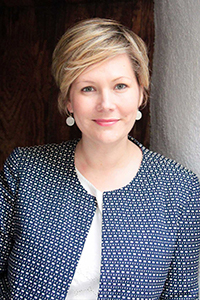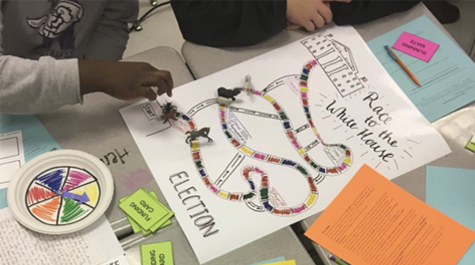Game-based learning brings play into the high school classroom
Multiplayer world-building games like Minecraft and Roblox allow adolescents to engage in complex creative thinking, as well as refine their skills of communication and collaboration. As gaming becomes ever more complex and accessible, education researchers and practitioners are exploring the possibilities of harnessing the power of gaming and incorporating it in schools.
Lindy Johnson, associate professor of English education, has been examining the role of games and play in the classroom for several years. A former English teacher in Boston Public Schools, she now trains new teachers at William & Mary and conducts research around the essential question, how can we make learning more engaging and authentic for both students and teachers?
 As an English teacher, I’ve always been interested in the out-of-school literacy practices that my students were involved in,” says Johnson. “What kinds of texts and digital media capture their interests and spark their imaginations—and how can we hook into those interests and bridge the divide into more academic literacies?”
As an English teacher, I’ve always been interested in the out-of-school literacy practices that my students were involved in,” says Johnson. “What kinds of texts and digital media capture their interests and spark their imaginations—and how can we hook into those interests and bridge the divide into more academic literacies?”
Johnson is also interested in helping current and future teachers become more attuned to the interests of youth so they can better connect and empathize with their students.
In a recent study, Johnson worked with students in her English Methods class to design, build and test an analog board game called Race to the White House. The class worked with a ninth-grade teacher at a local high school who was teaching a unit on evidence-based argumentation. The teacher reported that her students needed more practice making claims based on evidence and anticipating counterarguments.
“We wanted to connect the students’ out-of-school knowledge—their understanding of current events, interest in games and skills expressing their opinions—with the in-class experience of argumentative thinking and writing,” says Johnson. The class went through an iterative design process to develop a game in which players assume the role of presidential candidates. In order to advance across the board and toward the goal of becoming president, players must argue various policy positions using evidence and commentary to persuade their fellow players.
The project offered the preservice teachers an invaluable opportunity to engage with high school students on an authentic learning project. While teaching methods classes are typically theoretical in nature, with student teachers developing lesson plans and unit plans in their discipline, research has shown that these preservice teachers benefit greatly from increased opportunities for interactive learning on top of the traditional student teaching experience.
The students in Johnson’s English Methods class took the game to a local high school, with each W&M student facilitating a group of 4-5 ninth graders as they played the game. Johnson collected data in the form of written reflections from the preservice teachers, as well as audio recordings and transcripts of the group experience.
Johnson found that the game provided a valuable scaffold and shared language as the students practiced their skills in argumentation. Most importantly, it allowed students to produce arguments and critique the argumentation work of others in a playful context rather than through heated or intimidating discussions disconnected from real-world situations.
“The preservice teachers enjoyed the process of creating the game, and they absolutely loved playing their game with the kids,” said Johnson. “All of the ninth-grade students were highly engaged and the teacher particularly pointed out one student who would typically sleep through class, but who was really excited about the game. It was very rewarding for the students to see that level of excitement and motivation.”
This type of project also helps preservice teachers reimagine their role as educators, says Johnson. Interactive, collaborative experiences reposition the teacher as someone who works alongside students, rather than as an authority or as the sole expert in the classroom.
Johnson is now exploring other ways to bring play into the classroom. Through a Reveley Fellowship, she is collaborating with Meredith Kier, associate professor of science education, and Gexin Yu, professor of mathematics, to develop a course for W&M undergraduate students called “Game Changers: Exploring Big Ideas in Mathematics and Education through Game Play and Design.”
The course, which will be offered in Fall 2022, will explore the importance of play in the learning process, with students taking on the role of researcher-designer as they engage in a design process for creating meaningful games that promote deep learning around mathematical concepts. As a COLL 100 course, it will introduce students to big ideas across disciplines and provide opportunities to develop communication and collaboration skills.
Johnson is also involved in the university’s multi-disciplinary eSports initiative, which is exploring the intersections of gaming, learning theory, psychology, computer science and more.
“Unfortunately play has largely disappeared from our schools,” says Johnson. “Even in elementary schools, where playful, engaging pedagogy was once prioritized, we’re seeing play being extricated from the curriculum. And as a result, we see student engagement drop off precipitously as students advance through elementary and secondary school.
“Play and rigor are not mutually exclusive, but in fact are two necessary ingredients for a lifetime of curiosity and learning.”
 Skip to main content
Skip to main content

